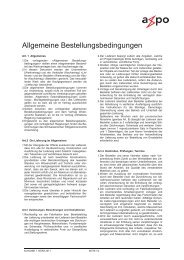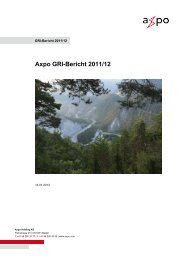Annual report 2008/09 - Axpo Group
Annual report 2008/09 - Axpo Group
Annual report 2008/09 - Axpo Group
Create successful ePaper yourself
Turn your PDF publications into a flip-book with our unique Google optimized e-Paper software.
Illustration: Geopower Basel AG<br />
Limited domestic potential<br />
In any country, the potential harboured by new renewable<br />
energies for the supply of electricity depends on factors such<br />
as climate, topography and population density. Switzerland<br />
has traditional advantages in hydropower, while the potential<br />
for wind energy and solar energy is limited by their very nature.<br />
Biogas and solid biomass can also already be used in Switzerland.<br />
Theoretically, the potential for geothermal energy<br />
is very high, but this technology is not yet secured. A dependable<br />
assessment cannot be made until a pilot plant has been<br />
operated reliably for at least one year.<br />
Although the renewable energies generally have a great<br />
deal of appeal, the actual construction of power plants is often<br />
a problem – small-scale hydropower projects, for example,<br />
often meet with resistance from water conservation lobbies<br />
and fi sheries. Wood-fi red power plant projects are also sometimes<br />
opposed by local residents, usually because of the<br />
height of the chimney or concerns about smoke pollution, while<br />
wind power plants are often resisted by landscape protection<br />
lobbies, and the installation of solar panels on house roofs in<br />
central urban zones can also be problematic.<br />
<strong>Axpo</strong> is making a difference<br />
<strong>Axpo</strong> has been offering <strong>Axpo</strong> natural electricity (“Naturstrom”)<br />
for several years, in particular from large- and small-scale<br />
hydropower plants and from the <strong>Axpo</strong> Kompogas biogas plants.<br />
<strong>Axpo</strong> has also set up a green electricity fund to further promote<br />
its natural electricity. This fund supports innovative<br />
projects in the fi eld of renewable energies by contributing<br />
to research and development, pilot or demonstration plants<br />
and studies.<br />
<strong>Axpo</strong> is convinced of the future of renewable energies<br />
and supports the objectives of the Federal Council. In order to<br />
consolidate its market leadership in this fi eld, <strong>Axpo</strong> will invest<br />
CHF 3 billion by 2030 in the promotion of renewable energies<br />
and the associated expansion of production capacities in<br />
Switzerland and abroad. In Switzerland, the focus falls on the<br />
generation of base load energy, in particular from small-scale<br />
hydropower and biomass facilities, extending in the longer term<br />
to geothermal energy. The emphasis abroad is on wind power,<br />
small-scale hydropower and biomass projects.<br />
4 4 5<br />
1 2 6<br />
1<br />
3<br />
8<br />
7<br />
District heating grid<br />
Electricity grid<br />
1 Probe drilling at various depths<br />
2 Injection drilling to transfer cold water<br />
to lower depths<br />
3 Fracture in crystalline bedrock<br />
4 Production drilling to transfer heated<br />
water to the surface<br />
5 Heat exchangers<br />
6 Turbine house with generator for<br />
electricity production<br />
7 Cooling of generator cycle (water cooling)<br />
8 Cooled water returns to the earth<br />
Sediment<br />
Crystalline<br />
6000 m<br />
<strong>Axpo</strong> Kompogas transforms organic<br />
waste into energy<br />
Biogenic waste, whether organic matter from<br />
gardens or domestic and commercial kitchen<br />
scraps, is an excellent energy source.<br />
With the innovative Kompogas process, biomass<br />
is fermented in an anaerobic environment<br />
in an enclosed reactor, producing<br />
compost and biogas. The biogas is fed into<br />
packaged combined heat and power plants,<br />
where it is either transformed into electricity,<br />
fed into the natural gas grid or used as<br />
biofuel.<br />
Around 14 million kilowatt-hours (kWh)<br />
of electricity are produced by the <strong>Axpo</strong><br />
Kompogas plants in Switzerland, and this<br />
fi gure is set to increase. <strong>Axpo</strong> Kompogas<br />
will soon be one of the leaders in the production<br />
of electrical energy from biomass<br />
in Switzerland and Europe.<br />
In order to consolidate its<br />
market leadership in new<br />
renewable energies, <strong>Axpo</strong><br />
will invest CHF 3 billion<br />
by 2030 in expanding the<br />
relevant production capacities<br />
in Switzerland<br />
and abroad.<br />
Revitalization of small-scale<br />
hydropower plants<br />
Small-scale hydropower plants with an<br />
output ranging from a few kilowatts to<br />
a maximum of 10 megawatts produce<br />
climate-friendly electricity and have a negligible<br />
impact on the natural environment.<br />
Accordingly, electricity from small-scale<br />
hydropower generally meets with a high<br />
level of acceptance. While around 7000<br />
small-scale hydropower plants were in<br />
operation in Switzerland a hundred years<br />
ago, the number has since dropped to<br />
about 1000. <strong>Axpo</strong> is committed to the revitalization<br />
of disused plants in its supply<br />
area.

















